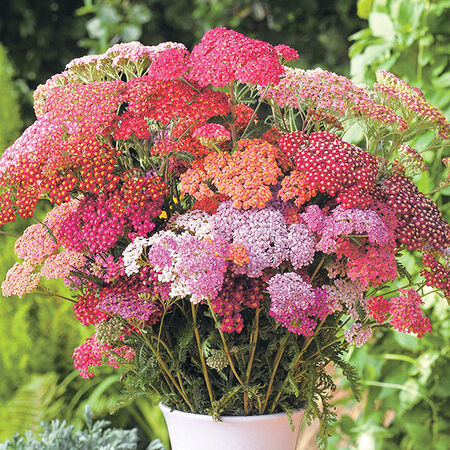Flowerburst Red Shades, Yarrow
Key Attributes
Key Attributes
Product Details
Weight
0.01Depth
0.15Height
4.5Width
3.25Plant Height
18-30"Botanical Name
AchilleaSeed Type
SeedAdditional Characteristics
Attracts Pollinators, Attracts Birds, Deer Resistant, Extended BloomsSeeds Per Gram
8,003Seeds Per Pound
3,628,800Packet
25 SeedsSow Depth
1/4"Seeds Per Ounce
226,800Breed
Open-pollinatedSun
Full SunGrowing Conditions
Container FriendlyUses
Cut Flower, Dried ArrangementsLife Cycle
PerenialSow Method
TransplantCategories
FlowersDays To Maturity (# Days)
125Components
Growing Instructions
![]() Learning Download: How to Grow Achillea
Learning Download: How to Grow Achillea
The Achillea, also known as Yarrow, is a very hardy perennial. It consists of small flowers grown on long stems, that make great cut flowers to store in a vase.
Before Planting: Achillea flowers prefer full sun and well-drained soil.
Planting: Plant seeds after the last frost date in the spring once the soil begins to warm. Space seeds 12 to 18 inches apart and cover them lightly with soil.
Watering: Once Achillea is established, it has low water requirements and will struggle if the soil is kept too moist.
Fertilizer: Typically, Achillea doesn’t require much fertilizer. However, you can fertilize once a year in the late fall or winter season by adding a shovelful of compost or a sprinkle of organic fertilizer.
Days to Maturity: The flower portion should be harvested when the petals are open and not yet brown or dried.
Harvesting: The leaves can be harvested anytime, but are best used in the spring and early summer. The root is best harvested in the fall.
Tips: Achillea is often harvested for its medicinal properties. Add a tablespoon of the chopped leaves or flower to a cup of boiling water and steep 10 to 15 minutes.
Shipping Schedule
Our Seed Promise
 "Agriculture and seeds" provide the basis upon which our lives depend. We must protect this foundation as a safe and genetically stable source for future generations. For the benefit of all farmers, gardeners and consumers who want an alternative, we pledge that we do not knowingly buy or sell genetically engineered seeds or plants.
"Agriculture and seeds" provide the basis upon which our lives depend. We must protect this foundation as a safe and genetically stable source for future generations. For the benefit of all farmers, gardeners and consumers who want an alternative, we pledge that we do not knowingly buy or sell genetically engineered seeds or plants.
The mechanical transfer of genetic material outside of natural reproductive methods and between genera, families or kingdoms, poses great biological risks as well as economic, political, and cultural threats. We feel that genetically engineered varieties have been insufficiently tested prior to public release. More research and testing is necessary to further assess the potential risks of genetically engineered seeds. Further, we wish to support agricultural progress that leads to healthier soils, to genetically diverse agricultural ecosystems, and ultimately to healthy people and communities.
To learn more about the "Safe Seed Pledge" please visit www.councilforresponsiblegenetics.org.

